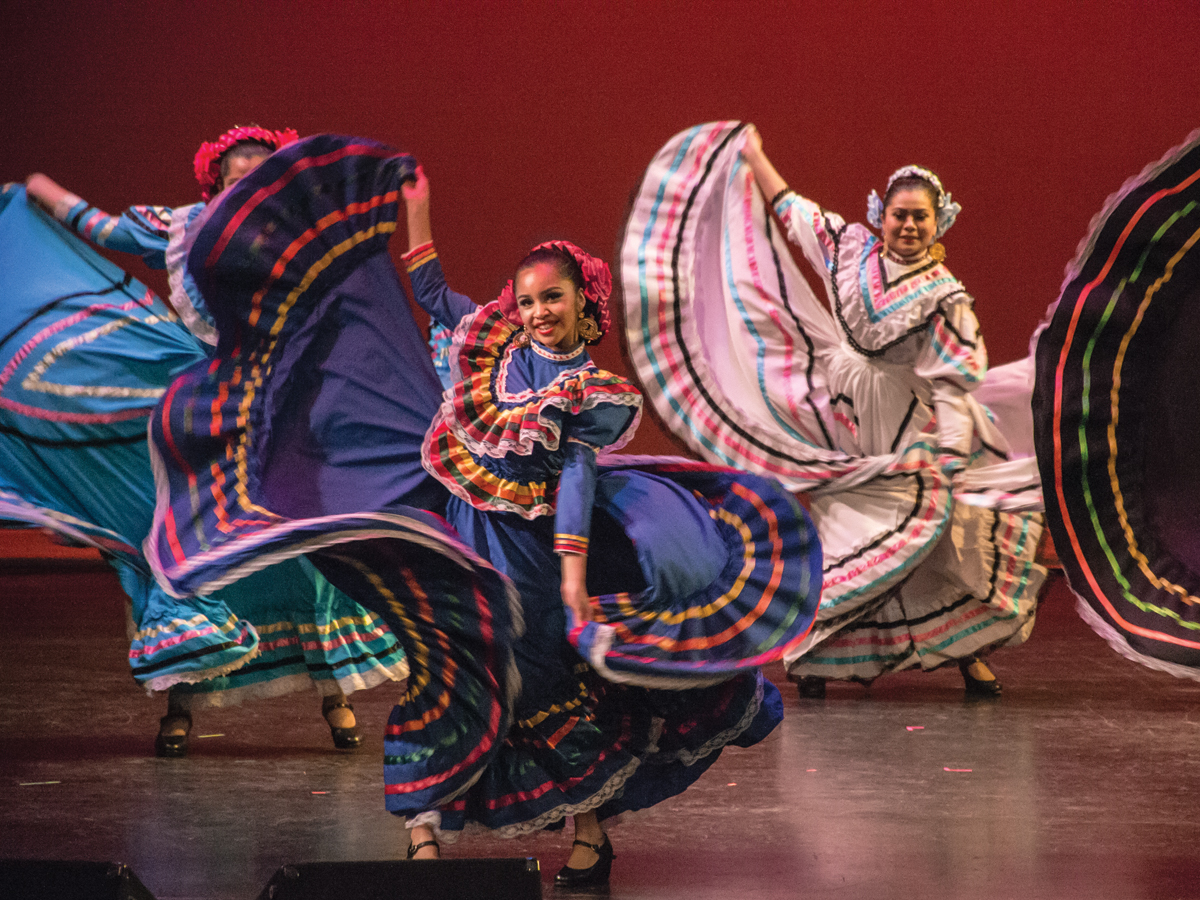
Friday the 13th, and what may have been a terrifying night for those who are superstitious, was an incredible night of celebration of Latino cultures. People of all ages gathered at the University Theater — not to hear scary stories but to hear genres of music from Latin America. Though doors opened at 6:30 p.m., many were lined up ahead of time, anticipating the show.
The speakers of the night were fifth-year students Cynthia Chavez and Jorge de los Santos, who initiated the night with hilarious introductions. The first act was first-place champion Ballet Folklorico from Moreno Valley High School. Following was the band that had the crowd wiggling their toes from song to song, Raices Peruanas. Representing Los Angeles, the goal of the nonprofit group founded in 1989 is to share the traditions of Peru. The group played “El Pio Pio,” or the chicken dance, and had the crowd swaying left and right in their seats. Soon after, the talented Luz and Gustavo Romero took the stage. The duet sang ranchera songs that had the audience blissfully singing along. In between songs, they would joke about love and marriage and kept the audience laughing. As soon as they finished their last song, the crowd yelled “otra,” meaning “another one.” It was not enough and the audience wanted more, but unfortunately there was not enough time for the Romero duo.
After sitting for so long it was time for the audience to get up and get their blood running, or better yet their stomachs running — who could resist fresh pan dulce (sweet bread) and hot chocolate? It was the perfect combination for a cold night.
Back in the theater, it was time for the most anticipated band, La Santa Cecilia. This group shared their love and pride for their Latino roots. Their songs told stories of immigration-related hardships that millions of people in the U.S. identify with and were therefore nicknamed “the voice of immigrants.” In 2014, the group won a Grammy for Best Latin Rock, Urban, or Alternative Album.
I was fortunate enough to meet bassist Alex Bendana, who was extremely talented and very down-to-earth. After chatting with him for a bit I learned many of the songs are based on real-life experiences from the band. “El Hielo” describes a situation of what it is like to work while undocumented. Back when the band was slowly starting to become known, the band’s accordionist Jose “Pepe” Carlos did not have documents to be able to work and had to overcome many obstacles. Their music serves to inspire those who find themselves in similar situations.
Being able to share their stories through music is what the band feels most proud of. “We didn’t know how people were going to react with our music and just finding that identity and connection with people that have a similar story as us is our biggest accomplishment,” Bendana shared joyfully. The band is consistently hitting the studio as they are currently working on a new album that is said to be released in May. Meanwhile, they are off performing from the West Coast to the East Coast in March.
From the get-go the band stirred up the crowd. They began with cumbia which got the crowd’s adrenaline going. They continued to sing many of their heartfelt songs, but just as lead singer Marisol Hernandez and the others were jamming out, the microphones went out. However, the band yelled, “Y le vamos a seguir,” meaning “we will keep going,” and they did so acappella. There was no music, but the beautiful voice of Hernandez did not require any background music or microphones.
After a few minutes, the technical difficulties were resolved and the band resumed with more energy. Each song only drew the crowd wilder. At first only a handful were brave enough to get up and dance in the aisles, but slowly every row got up and there was no stopping after that. Time was up and the band waved goodbye, or so everyone thought. Completely lost in the music, the audience was not yet ready to go home and wanted more, pleading them to return and play at least one more song. The band could not refuse and played a handful more.
Sadly all good things must come to an end, and the show came to a finish. But on the bright side, from the youngest to the oldest, everyone left the theater bubbly and groovy.
It took the help of many to make this show possible. One who contributed to the success of the event was Social and Cultural Programmer of Chicano Student Programs (CSP) Arlene M. Cano. CSP offers resources for Latino students and organizes events to help maintain the Latino culture alive and make students feel welcomed. “The process to bring this together takes a lot of time, a lot of passion, a lot of energy, but it is well worth it,” shared Cano cheerfully. With events such as these, Cano hopes students learn that their identity matters no matter the race or culture. “One day the children (at Noche Cultural) will see themselves here and remember that one day they sang mariachi at UC Riverside and I hope they remember our office,” said Cano.








